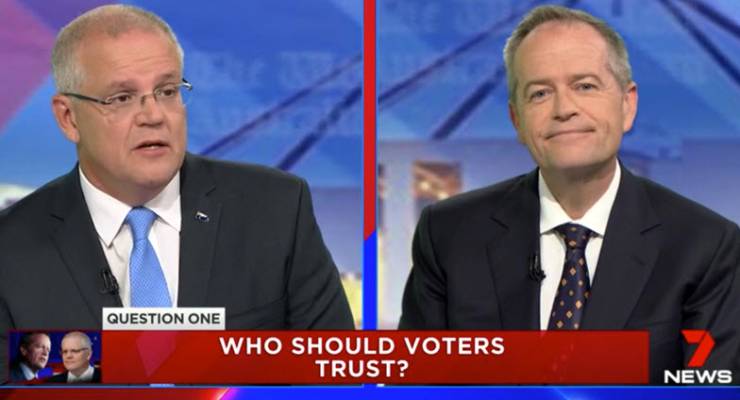
Scott Morrison had vim and vigour and even had his opponent on the ropes a couple of times, but Bill Shorten came out ahead in last night’s leaders’ debate because he understood election debates are most effectively used as extended media conferences rather than opportunities to interact with your opponent.
The lesson goes back to the first televised debate in Australia, between Bob Hawke and Andrew Peacock at the National Press Club in 1984. Hawke treated it as a debate. Peacock spoke straight to camera and pitched his remarks to the audiences watching at home, not the occasionally rather merry audience in the room. Shorten also spoke to the camera while Morrison spoke to Mark Riley and Lanai Scarr, but more importantly Shorten used the debate to deliver his key point to voters, about the economy not working for them.
His final pitch hammered exactly that theme. This is now established as Labor’s most effective rejoinder to Coalition claims to superior economic management — shifting the debate to management of the economy for working people. It’s an idea propounded for years by US Democrat pollster Vic Fingerhut and one that is now central both to Labor’s core message to voters and its strategy of recent years to address and exploit the widespread perception the political-economic system is being managed in the interests of corporations and elites.
Morrison, who in his first ever election debate was feisty and more likeable than Shorten, started strongly and repeatedly interrupted his opponent — which he needs to do, since he’s the one who has to make up ground over the next three weeks (Keating used a highly combative and ill-mannered approach while debating John Hewson in 1993, and it worked). At times this seemed to rattle Shorten, but rather than allow this free flow to continue, moderator Basil Zempilas jumped in several times, depriving us of any genuine dialogue between the leaders.
Shorten — who surprisingly bested Malcolm Turnbull in a 2016 debate — found his feet despite being pressured over Labor’s franking credits reform and the cost of its climate policies. His response on the latter point — that any costs were actually an “investment” and we needed to get on with climate action because the government was paralysed — failed to answer the questions but appeared to resonate with the audience. By the end, Morrison was left to repeat his warnings about a strong economy and Labor’s tax plans while Shorten, by now fully on his game, zeroed in on Labor’s own initiatives designed to deliver better services for voters.
How many votes the debate will change isn’t clear — probably not too many, given the viewership, the annoying format and the general indifference of the electorate. Morrison can improve for Friday’s second debate, also locked away in televisual obscurity, this time on Sky. He’s got to be even more combative, however much voters say they don’t like it. At the moment he’s offering a status quo message that contrasts poorly with Labor’s narrative of addressing voter disaffection. He needs to rip apart Labor’s narrative, Keating-style, and he doesn’t have a lot of time. The next debate might be a lot less civil than last night’s proceedings.








Crikey is committed to hosting lively discussions. Help us keep the conversation useful, interesting and welcoming. We aim to publish comments quickly in the interest of promoting robust conversation, but we’re a small team and we deploy filters to protect against legal risk. Occasionally your comment may be held up while we review, but we’re working as fast as we can to keep the conversation rolling.
The Crikey comment section is members-only content. Please subscribe to leave a comment.
The Crikey comment section is members-only content. Please login to leave a comment.